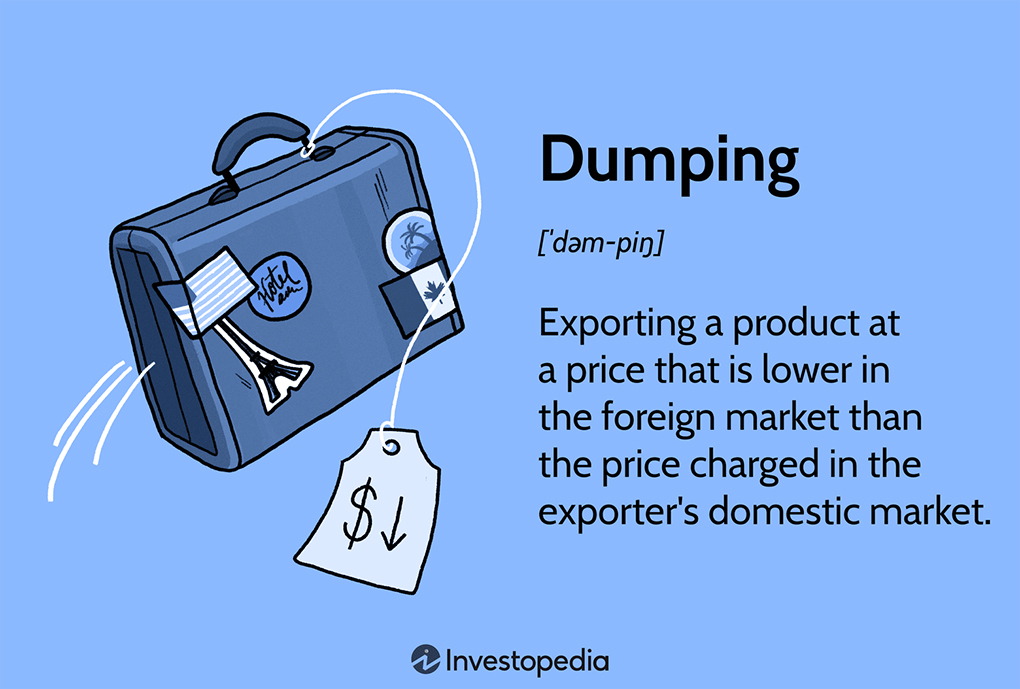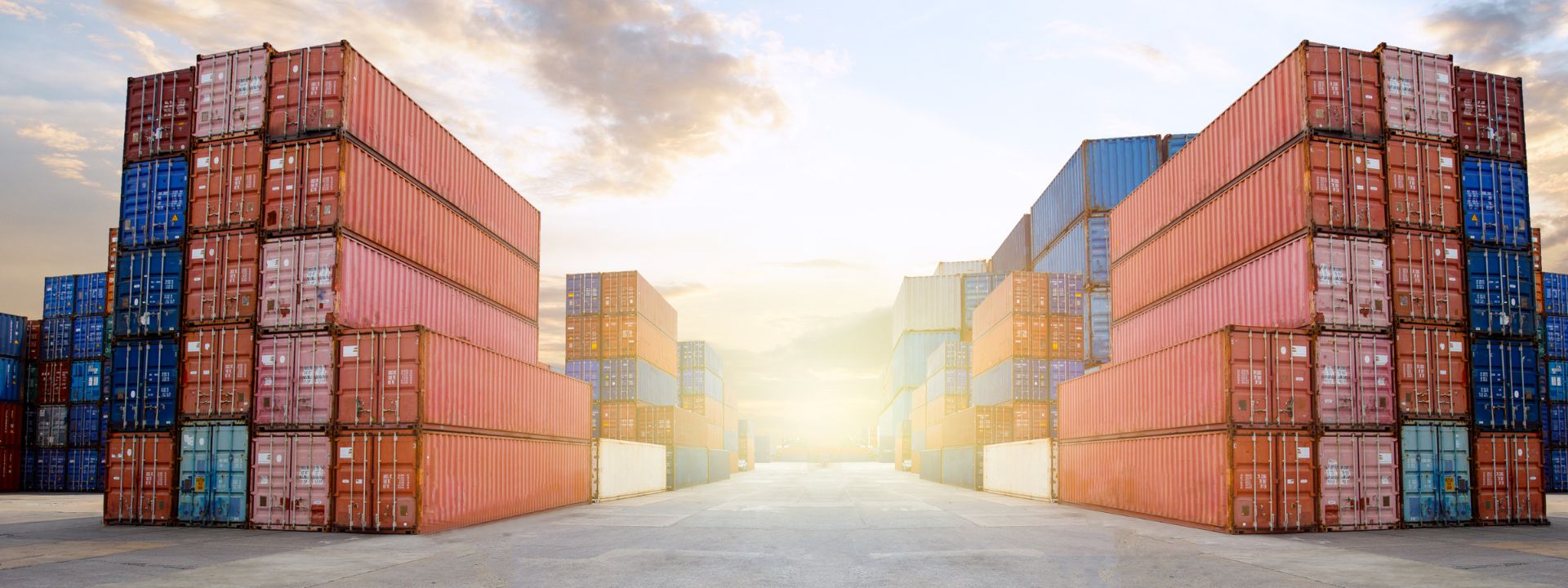Unmasking The Menace of Dumping in Global Trade
Unmasking The Menace of Dumping in Global Trade

Urgent Action Needed to Combat Unfair Trade Practices
In the intricate web of global commerce, a practice lurks in the shadows, threatening the very fabric of fair trade: Dumping. Far from being a mere economic term, dumping represents a dire threat to industries worldwide, undercutting fair competition and destabilising markets. Let’s delve into the murky depths of dumping practices, uncovering their insidious impacts and rallying for concerted action to stem their tide.
The Dark Art of Dumping:

Dumping, in its essence, involves selling goods in foreign markets at prices lower than their domestic market value or production costs. While seemingly advantageous for consumers in the short term, its ramifications are far-reaching and damaging. From manufacturing overcapacity to geopolitical tensions, the roots of dumping run deep, threatening the stability of global trade. Simply put, product dumping refers to the practice of exporting goods to another country at a price lower than the cost of production or below the price charged in the domestic market. This can have significant impacts on both the market and the industry involved. The two main and obvious impacts:
- Dumping can lead to artificially low prices in the importing market, undercutting domestic producers and distorting market dynamics.
- Domestic producers may struggle to compete with the lower prices offered by dumped goods, which could reduce profitability and potentially force some out of business.
Indeed, we have been witnessing this very close to home in the European cartridge remanufacturing industry. And it’s real! But it doesn’t stop here. The impacts and consequences are both far-reaching and devastating.
- Dumping significant quantities of goods into a market can result in oversupply and market saturation.
- This can lead to inventory build-up, price wars, and downward pressure on prices, negatively impacting the profitability of both domestic producers and importers.
- Domestic producers may lose market share to dumped goods, mainly if they cannot match the artificially low prices.
- Over time, this can weaken domestic industries and reduce their competitiveness in both domestic and international markets.
For the perpetrators of dumping, this is exactly what they want to achieve: market share and global dominance. Some will argue it’s just a ‘one-off’ and argue ‘everyone does it occasionally’. Of course, this is an argument that holds water. It’s not unheard of for the EU and other countries to ‘dump’ end-of-life, obsolete or overstock in other countries like Africa, South America and India at cost or below cost to empty EU warehouses and make way for new products and stock. But that’s OK – it’s not our problem if it’s going out and away! It’s only our problem when it’s incoming and affects our markets and bottom line. We can’t have our cake and eat it!
Undermining Fair Competition:
Dumping disrupts the level playing field, unfairly disadvantaging domestic industries and producers. By flooding markets with cheap imports, dumped goods drive down prices, rendering local businesses unable to compete. The consequences are dire, leading to job losses, industry closures, and a weakened economic landscape.
We have seen this far too frequently in Europe in recent years. Newly built compatible printer cartridges produced mainly in Chinese factories are being ‘dumped’ onto the European market for less than €2.50! This sublime price for a finely engineered, complex electronic piece of equipment built with many components, including semiconductor chips, then boxed and labelled, selling for less than a cup of coffee! How can that be?
More recently, Chinese electronics giant Ninestar and its subsidiaries have been banned from supplying goods to the US, accused of using forced labour and alleged human rights abuses. Whatever the facts or motivations are in this saga, the point is that Ninestar is being denied access to the biggest and most lucrative market on the planet. So where do all the finished products end up? Where are those container ships heading for now? How does Ninestar keep the factory fires burning? By dumping the product onto other markets, there is no other strategy they must sell the products. Where is the next biggest market in the Western world? Europe, of course. This is why only this month, the European Council and European Parliament have announced a ‘provisional’ EU agreement target to ban the sale and export of products made using forced labour following, albeit meekly, in the footsteps of the US Court of International Trade. Whether this new EU legislation will have the teeth to be a strong enough deterrent is yet to be seen.
Quality & Supply Chain Concerns:
- Dumped goods may be inferior quality and non-compliant compared to domestic products, undermining consumer confidence and trust in the market.
- This can have long-term consequences for the industry’s reputation and the market.
- Dumping can disrupt existing supply chains and relationships within the industry.
- Domestic producers may need help sourcing inputs or finding markets for their products if their competitors engage in dumping practices. In turn, this will lead to long-term industry decline.
Persistent dumping can erode the profitability and viability of domestic industries over the long term, leading to a loss of innovation, investment, and skilled labour within the industry. This ultimately harms its long-term competitiveness and sustainability. And therein lies the real threat!
The Human Cost:
Furthermore, it’s not just about the product, price dumping, or the market impact. Behind the statistics lie human stories of hardship and struggle. For workers in industries ravaged by dumping, the impact is devastating. Families face uncertainty as livelihoods evaporate, communities fracture, and futures hang in the balance. Dumping isn’t just an economic issue; it’s a humanitarian crisis with far-reaching implications.
A European Call to Arms:
Addressing dumping demands a multifaceted approach. From stringent trade regulations to proactive enforcement measures, the battle against dumping requires unity and resolve on a global scale. Governments, industry stakeholders, and international bodies must collaborate to fortify defences against unfair trade practices and safeguard the integrity of the global marketplace. To quote that famous line from Die Hard, “You are either part of the problem or part of the solution”. Which is it, people? And if you’re not part of the solution, don’t complain about the problem!
What steps are being taken to tackle dumping by the EU?
The EU has a few so-called ‘trade defence instruments’, including anti-dumping legislation, that it can use to fight unfair trade practices. Yet dumping continues almost with impunity, and the effectiveness of these instruments remains questionable, especially if they are not being enforced!
One way to tackle dumping is to charge anti-dumping duties on these products. The EU can respond by imposing anti-dumping duties as a trade defence instrument. In 2017, MEPs voted to update the rules that regulate when and how those duties can be imposed. MEPs approved additional rules allowing the EU to impose higher tariffs on dumped or subsidised imports in May 2018. So, the practice of ‘dumping’ is illegal, so why are companies still able to get away with it? Aside from dumping being an unlawful practice, many, if not all, products being dumped do not comply with or conform to the local mandatory product legislation and may be hazardous.
The main target of EU anti-dumping duties is China. In October 2016, duties were imposed on more than 50 different Chinese products, mainly aluminium, bicycles, cement, chemicals, ceramics, glass, paper, solar panels, and steel. No mention was made of cartridges or electronics!
Conclusion:
Dumping is not merely an abstract concept confined to economic textbooks; it’s a tangible threat with real-world consequences. As we navigate the complexities of a globalised world, confronting dumping head-on is paramount. Through collective action and unwavering commitment, we can forge a future where fair trade prevails and all nations stand on equal footing in the pursuit of prosperity.
The irony, however, is that despite knowing all of this and the impact it is having directly on your market and sales, many EU cartridge businesses and remanufacturers continue to buy from these companies and their affiliates, which engage in dumping. They fund the low-cost illegal products and dumping strategy with every $1.00 they spend with these companies. Not to mention financially complicit in supporting companies accused of using forced labour!
While product dumping may offer short-term benefits for the exporting country or company, its long-term impacts on the market and the industry can be detrimental, leading to economic distortions, trade disputes, and the erosion of competitiveness.
It’s time to be part of the solution and not the problem. Yippee-Ki-Yay!

 Jason Doran is the author of this hot topic article, “Unmasking The Menace of Dumping in Global Trade.”
Jason Doran is the author of this hot topic article, “Unmasking The Menace of Dumping in Global Trade.”
He is an accomplished, pragmatic and results-driven general manager, sales director and business development professional with over 25 years of experience leading world-class UK and European sales growth and product management within the retail and wholesale sectors of consumer electronics, printer hardware and office consumables. He possesses a diverse, high-level skill set spanning commercial and financial acumen, strategic leadership and business development.
Jason is
Related:
- Chips and Firmware Updates and Lock Out Strategies
- The Russian Market Is Stable and Well Supplied
- Gold East Attracts New Customers with Part Box Waste Assembly Solutions
- Buyers Tell HYB Why They Reject Low-quality Copier Toners
Please comment below about this hot topic, “Unmasking The Menace of Dumping in Global Trade.”




Leave a Comment
Want to join the discussion?Feel free to contribute!